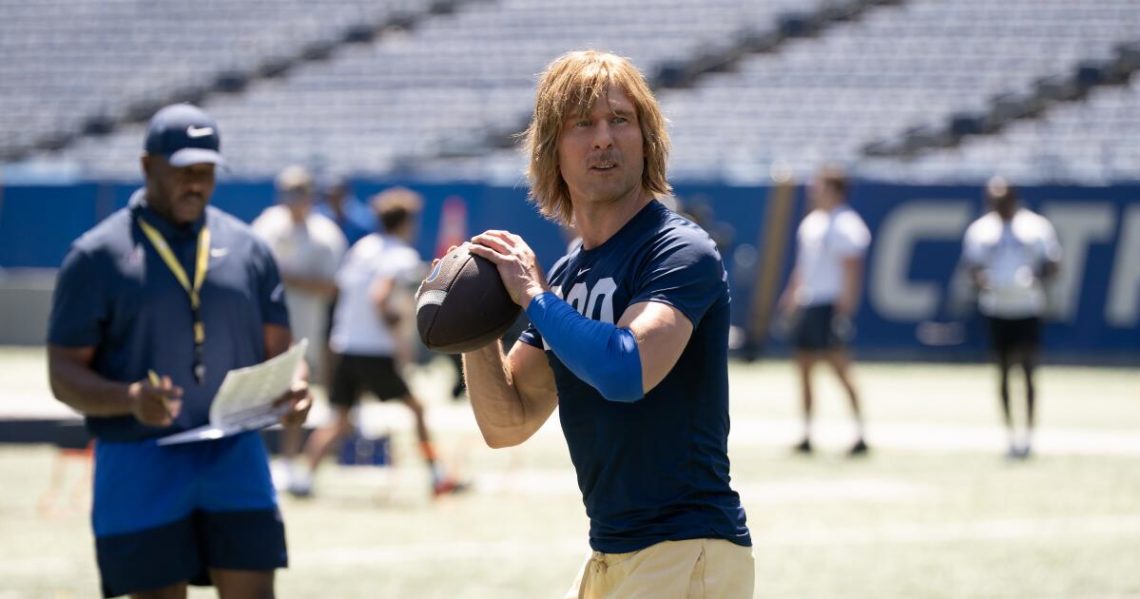In “Chad Powers,” premiering Tuesday on Hulu, Glen Powell, who co-created the series with Michael Waldron (“Loki”), plays Russ Holliday, a disgraced collegiate quarterback. In a quick telegraphing of character, we meet him driving a Cybertruck, the official vehicle of shallow narcissists, on his way to a Hollywood nightclub (the official hangout of shallow narcissists). Eight years earlier, at the climax of a season that included suspension, tabloid headlines and “the Las Vegas freeway incident,” he blew a chance at redemption, when, after a game-losing mistake, he punched a fan on the sidelines, who crashed into his son, a sick child in a wheelchair.
Now he’s lying to himself that his exile was football was in fact a good thing. “I never would have done ‘The Masked Singer,’ never would have met my buddies in crypto and NFT.” Nevertheless, he’s excited about going back to the game, playing for the Vegas Vipers in the XFL league (in real life, it’s a team that no longer exists in a league that no longer exists, which I know only because I looked it up — and it was the worst team as well). Then comes the news that the wheelchair-bound child has died, bringing Russ’s moment of (greatest) shame back into the public eye; the offer is withdrawn and his agent drops him.
So Russ is a bad guy, but he’s also a sad guy, broken inside, living in a room filled with old trophies in a house belonging to his father (Toby Huss), a movie makeup artist. Sent to deliver some prosthetics to the Fox Studios lot, he sees a billboard for “Mrs. Doubtfire,” the 1993 Robin Williams nanny-impersonation film, at the exact moment he hears a report of open tryouts for the South Georgia Catfish, which has lost two quarterbacks to transfers. A light goes on, and he takes off with his father’s kit and heads for Georgia, where he will become Chad Powers.
Restricted by the materials he has on hand, Russ gives himself a big nose, inflated cheeks, long hair and prosthetic teeth — not quite Jerry Lewis-crazy, but nothing you won’t notice — which he’ll top off with an unplaceable hick accent. It’s the very look — and name — that Eli Manning adopted for the 2022 stunt the series is based on, from his ESPN series “Eli’s Places.”
Arriving on campus, he’s immediately tackled by Danny Cruz (Frankie A. Rodriguez), the team mascot, who takes him for a school shooter — not so much to protect his fellow students but for the celebrity it might give him. With Russ’ fake face in disarray, Danny recognizes him from the tabloids, grasps the situation — helpful to any viewers who haven’t figured it out for themselves — and appoints himself Russ’s helper, “partly because I want to believe that we’re all human and no one is beyond second chances and partly because if this works you’ll owe me, which I like.”
Any objection a viewer might raise about, say, lack of identification, transcripts or not being enrolled as a student will be quickly dispensed with, as Russ-as-Chad quickly proceeds to tryouts, where his howitzer arm impresses head coach Jake Hudson (Steve Zahn), under pressure to deliver wins. His daughter, and recently named assistant coach, Ricky (Perry Mattfeld), is a former track star who lost her mojo and is now regarded merely as a nepo baby, or fears that she is; she’s trying to be taken seriously. Coach Dobbs (Clayne Crawford), the quarterback coach, is dismissive and insulting; Coach Byrd (Quentin Plair) isn’t. The team’s remaining quarterback, Gerry Dougan (Colton Ryan) is a caricature, a go-getting, God-thanking player of little talent and fragile ego expressly made to be mocked. (It feels a little cheap.) The rest of the team remains undifferentiated.
The bizarre prosthetics and silly voice make it hard to take Chad quite as seriously as the series would like us to. Although it serves the practical and philosophical purposes of the story, Chad, who comes off as a sweet idiot, doesn’t make sense as a person Russ would imagine or inhabit. (Russ disappears completely when he’s Chad; oddly, or perhaps not, he’s more compelling company when out of costume, if also a worse person. It’s kind of a relief.) Other characters regard Chad as strange without seeing him as suspicious and accept the increasingly ridiculous stories Russ invents to keep selling the lie. Well, he’s winning games, so maybe no one wants to look too hard. But that the truth eventually will out is clear from the moment he puts on the phony face, and that at some point, those who trusted him will feel betrayed. That isn’t a spoiler, it’s just Hollywood physics.
Though the series was inspired by Manning’s stunt, it’s fed by some well-traveled, conventional tropes. There’s the story of the bad person who becomes a better person by pretending to be one, which is the direction Russ is indirectly headed, or why are we watching? (Dustin Hoffman in “Tootsie”: “I was a better man as a woman than I was as a man.”) There’s the one about the mysterious phenom who turns around a team’s fortunes — the basis of “Damn Yankees” and “The Natural” and, in its way, “Ted Lasso.” Although the name Chad Powers derives from Manning’s prank, it’s also suggestive of Kenny Powers, Danny McBride’s character in “Eastbound & Down,” a washed-up pitcher who tumbles from the major leagues to substitute teaching at his old middle school. Down on their luck athletes are also at the center of “Cinderella Man,” “Mr. Baseball” and the recent Owen Wilson comedy “Stick.” I will say again that “The Bad News Bears” is one of the most influential films of the 20th century.
As the six-episode series goes on, it slips out of comedy into drama, as Russ and Danny weather the stresses of their conspiracy, Chad and Ricky navigate their sub-romantic friendship, and Coach Hudson frets over keeping his job (and his notably absent wife). The question of identity that underscores the series rises to the surface. And the more serious tone gives the valuable Zahn — a very fine actor often hired to be funny but playing absolutely straight — and the quietly intense Mattfield some lifelike father-daughter scenes to play, in fraught and affectionate moods. (Only Wynn Everett as Tricia, the new head of the boosters’ association, is meant to be funny throughout, and is.) There is a lot of loose angst flying around by the end of the season, which is obviously not, or not meant to be, the end of the story. Nothing is concluded.
The post In ‘Chad Powers,’ Glen Powell puts on a silly face and suspends all seriousness appeared first on Los Angeles Times.




